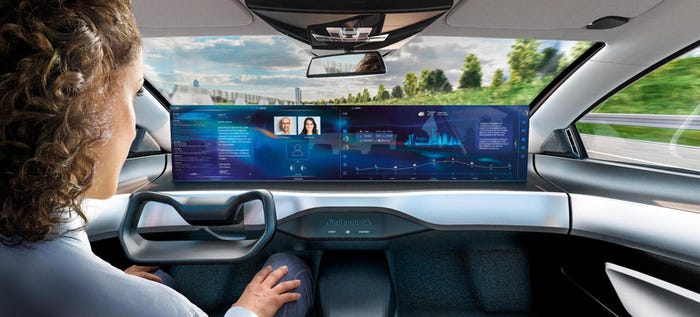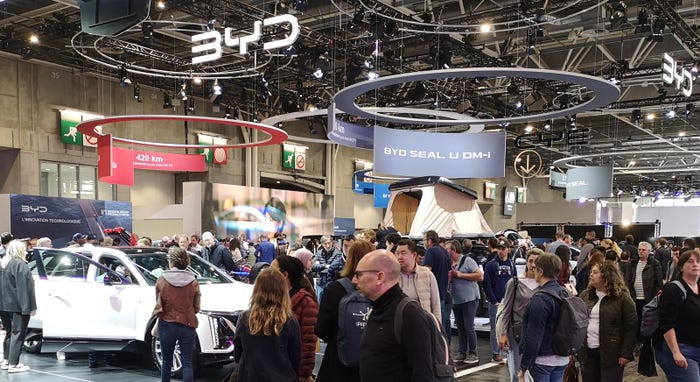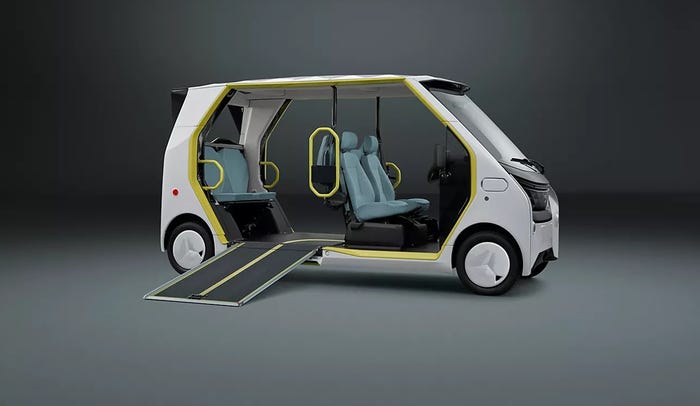Digital Kiosks Designed to Jump-start BEV Sales
Dealers praise kiosks for sparking conversations, education.

When Volkswagen instructed its dealerships to install digital kiosks to enhance the launch of its ID.4, the main purpose was to help educate customers about owning and driving a battery-electric vehicle. The kiosks serve as consumer touchpoints and as a good way for salespeople to engage in casual “watercooler conversation” with a customer, Danny Ryan, general manager of two VW stores in the Los Angeles area, tells Wards.
Digital kiosks have become useful sales and marketing tools for dealerships, allowing them to engage customers by offering interactive vehicle buying experiences.
The kiosks in Ryan’s stores turned out to have many more uses. They have “transitioned into something dynamic and exciting,” says Ryan, general manager of McKenna Volkswagen dealerships in Cerritos and Huntington Beach.
There are three kiosks in Ryan’s Cerritos store and two in the Huntington Beach store. BEV owners or potential owners can learn how to charge the vehicle, locate charging stations, look at inventory and see accessories, among other uses.
The interactive kiosks were installed by Spectrio, a digital signage solutions company based in Tampa, FL. It works with about 3,000 dealerships providing content and hardware that includes the kiosks and digital showroom screens.
The cost ranges from $300 a month to $4,000 a month or more, “depending on how fancy (the dealership) is going to get,” says Dan McAllister, Spectrio’s chief revenue officer.
Some dealerships have nine-screen video walls and welcome screens plus screens at every service desk. “People really buy into it,” says McAllister. “It declutters the dealership.”
The kiosks can be leased or purchased, and Spectrio offers financing options. Some manufacturers, such as VW and General Motors, subsidize the cost, he says.
Ryan doesn’t have an exact measure of the displays’ return on investment.
Dealerships have until June 9 to be fully compliant with the federal Safeguards Rule, which includes protecting all customer information from cybertheft. The kiosks do not represent a cybersecurity risk, says McAllister. “Anything that is not being used is shut down,” he says. “If we aren’t using content, we deactivate it. Our server isn’t looking for information to be fed into it. We don’t store personal information.”
Spectrio has a library of pre-approved templates that dealerships can use to personalize the content and tell their stories. The company works with auto manufacturers to create the templates.
A representative then works with the dealerships to “make sure they are creating fresh, interesting stuff on a regular basis,” says McAllister. “The challenge is getting the content right.”
Ryan’s two stores also have Spectrio’s digital screens mounted on the showroom wall. The content is specific to the dealership.
“The display boards allow us to merchandise all kinds of stuff, especially our five-star (online) reviews. Those rotate on the screen along with daily specials,” says Ryan.
McAllister says dealers are always finding new ways to use Spectrio’s digital displays.
One dealership celebrates a vehicle purchase by taking a photo of the new owner with their vehicle. There is a big countdown, then celebratory music plays as the photo is displayed on every digital screen in the showroom. The celebration can also be pushed out on social media.
By scanning a QR code, the digital content can be displayed on a mobile phone or tablet.
Video on demand is a new offering. One potential use is showing a customer waiting for a car to be delivered accessories for that vehicle or a list of F&I items.
“We have always had that kind of content,” says McAllister, “but the on-demand part has been a challenge from the technical perspective. We have solved that.”
About the Author
You May Also Like



.jpg?width=700&auto=webp&quality=80&disable=upscale)

